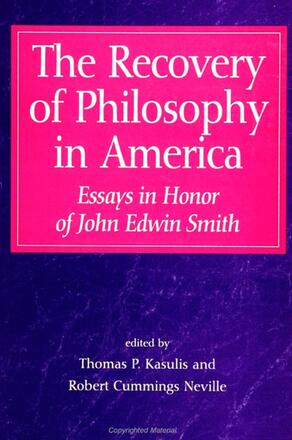
The Recovery of Philosophy in America
Essays in Honor of John Edwin Smith
Alternative formats available from:
This collection of essays by leading American philosophers honors John E. Smith, a major figure in the struggle for the American profession of philosophy to redefine itself and return to its grander traditions.
Description
Philosophy in America enjoyed a golden age at the end of the nineteenth and beginning of the twentieth centuries with the flourishing of distinctive and original schools of pragmatism, idealism, and naturalism. These American philosophies shared a family of conceptions of human experience far richer than their contemporary European schools of empiricism and phenomenology. The American conceptions of experience embrace critical and speculative conceptions of reason, presenting decisive alternatives to the Kantian foundationalist project that expressed itself in positivism, analytic philosophy, and phenomenology. During the middle part of the twentieth century these American philosophies were eclipsed by the European schools, however, and philosophy was reduced from the public intellectual roles given it by the likes of William James and John Dewey to a narrow academic practice interesting to few other than academic philosophers.
John Edwin Smith, through a long publishing and teaching career at Yale, has championed the rich American conceptions of experience and speculative reason, and it seems that at the end of this century they are returning in triumph. This book celebrates the recovery and new growth of American philosophy in a stunning variety of connected and vital intellectual projects represented by its contributors: George Allan, Douglas R. Anderson, Lewis S. Ford, Errol Harris, Richard Hocking, Thomas P. Kasulis, George R. Lucas, Jr., Robert Cummings Neville, Donald W. Sherburne, Merold Westphal, Kuang-ming Wu, and Carl G. Vaught. Displaying philosophy's recovery in America, this book also honors John Edwin Smith, who has kept the history and trajectory of philosophy in America in sight, and who contributes a prophetic commentary on the other essays.
Thomas P. Kasulis is Professor of Comparative Studies at Ohio State University. He is editor (along with Roger T. Ames and Wimal Dissanayake) of Self and Deception: A Cross-Cultural Philosophical Enquiry and Self as Body in Asian Theory and Practice, both published by SUNY Press. Robert Cummings Neville is Dean of the School of Theology and Professor of Philosophy, Religion, and Theology at Boston University. He has written many books including most recently The Truth of Broken Symbols and Normative Cultures, both published by SUNY Press.